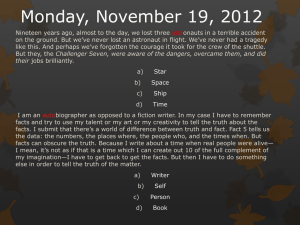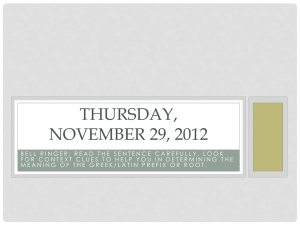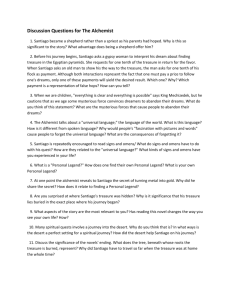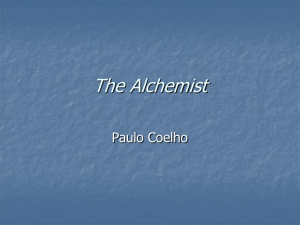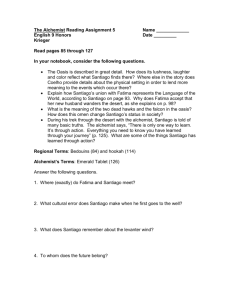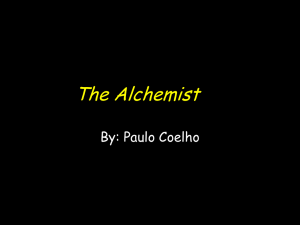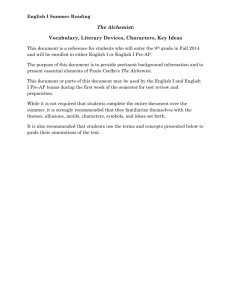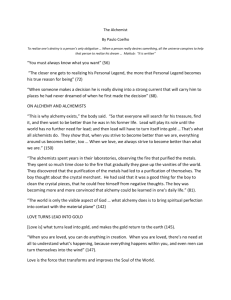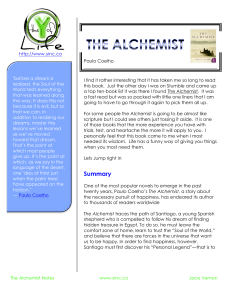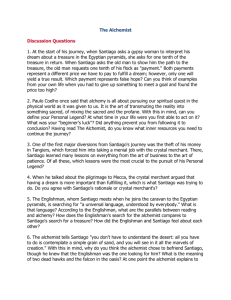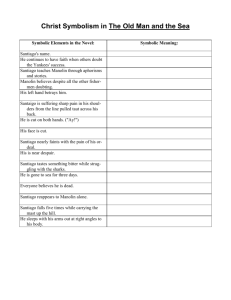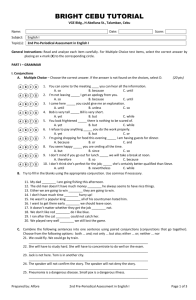Student Study Guide for The Alchemist
advertisement
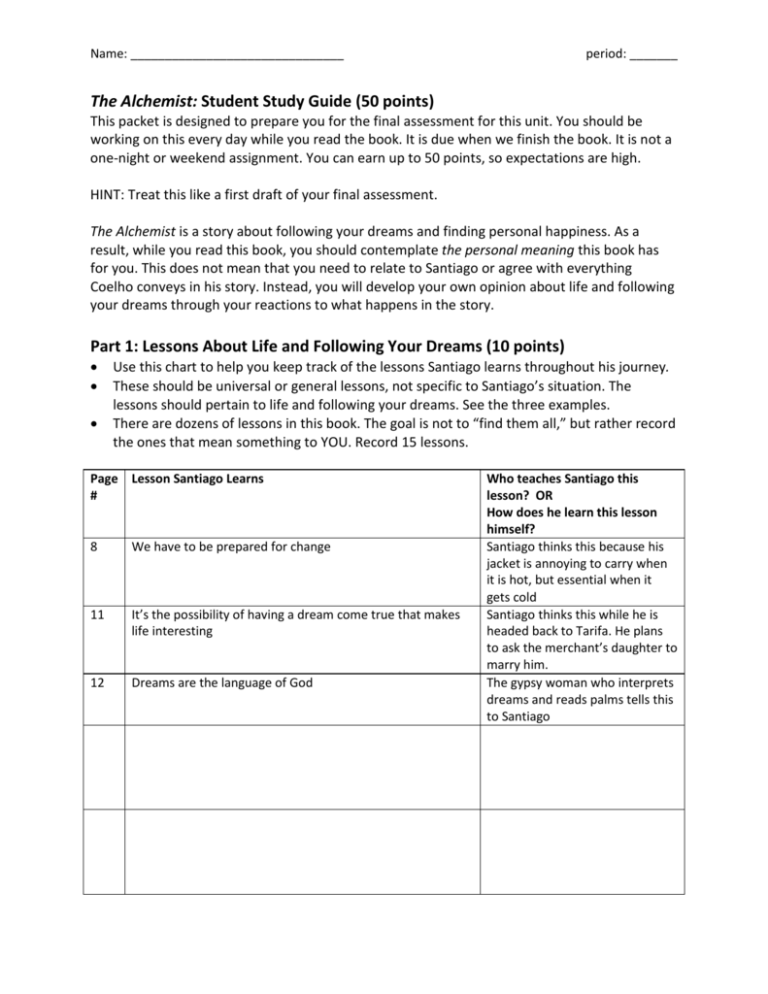
Name: _______________________________ period: _______ The Alchemist: Student Study Guide (50 points) This packet is designed to prepare you for the final assessment for this unit. You should be working on this every day while you read the book. It is due when we finish the book. It is not a one-night or weekend assignment. You can earn up to 50 points, so expectations are high. HINT: Treat this like a first draft of your final assessment. The Alchemist is a story about following your dreams and finding personal happiness. As a result, while you read this book, you should contemplate the personal meaning this book has for you. This does not mean that you need to relate to Santiago or agree with everything Coelho conveys in his story. Instead, you will develop your own opinion about life and following your dreams through your reactions to what happens in the story. Part 1: Lessons About Life and Following Your Dreams (10 points) • • • Use this chart to help you keep track of the lessons Santiago learns throughout his journey. These should be universal or general lessons, not specific to Santiago’s situation. The lessons should pertain to life and following your dreams. See the three examples. There are dozens of lessons in this book. The goal is not to “find them all,” but rather record the ones that mean something to YOU. Record 15 lessons. Page Lesson Santiago Learns # 8 We have to be prepared for change 11 It’s the possibility of having a dream come true that makes life interesting 12 Dreams are the language of God Who teaches Santiago this lesson? OR How does he learn this lesson himself? Santiago thinks this because his jacket is annoying to carry when it is hot, but essential when it gets cold Santiago thinks this while he is headed back to Tarifa. He plans to ask the merchant’s daughter to marry him. The gypsy woman who interprets dreams and reads palms tells this to Santiago 2 3 Part 2: Personal Response Questions (30 points) • • • • • Respond to these questions after you have read the appropriate section. 3rd and 4th periods: Refer to the first page number. 5th period: refer to the second. Neatly handwrite or type your responses on a separate sheet. Attach your responses to this packet and turn in. Your response to each question needs to be complete and detailed. I recommend writing several sentences in response to each question. Some questions will lend themselves to longer responses. Remember, this is all in preparation for your final assessment. 1. Page 25/26: What is a Personal Legend? What is your Personal Legend? How do you know this is your Personal Legend? 2. Page 25/26: King Melchizedek tells Santiago, “when you want something, all the universe conspires in helping you achieve it” (22/23). Write about a time when you wished for something and it seemed like the universe conspired either for you or against you. What made you feel that way? What was the outcome? 3. Page 33/35: What is an omen? What omens have you encountered in your life? 4. Page 47/50: What obstacles have you faced or do you anticipate facing while pursuing your Personal Legend? Compare and contrast your obstacles with the four obstacles Paulo Coelho discusses in his introduction to The Alchemist. 5. Page 56/57: The crystal merchant admits to Santiago, “I’m afraid that if my dream is realized, I’ll have no reason to go on living” (55/57). Why do you think people like the crystal merchant are afraid to achieve their dreams? Do you have a goal or dream that intimidates you or you are afraid to pursue? Explain why. 6. Page 56/57: The crystal merchant implies that simply having a dream is more important than fulfilling it. Do you agree or disagree? Explain why. 7. Page 79/83: The Englishman explains to Santiago, “There’s no such thing as coincidence” (72/75). Do you think luck and coincidence play a role in attaining a Personal Legend? Explain. 8. Page 85/89: The camel driver reveals to Santiago, “I’m interested only in the present. If you can concentrate only on the present, you’ll be a happy man…Life will be a party for you, a grand festival, because life is the moment we’re living right now” (85/88-89). Explain the camel driver’s advice. Do you agree or disagree? Why? 4 9. Page 87/91: The alchemist believes that “God created the desert so that man could appreciate the date trees” (87/91). What does the alchemist mean? How might it apply to your life today? 10. Page 127/134: The alchemist tells Santiago, “There is only one way to learn. It’s through action” (125/132). Do you agree or disagree with the alchemist? Explain. 11. Page 127/134: The alchemist urges Santiago, “Listen to your heart. It knows all things” (127/134). Write about a time you followed your heart. Do you feel it was the correct thing to do? Is there a difference between following your heart and following your gut? 12. Page 132/139: Santiago remembers a proverb: “The darkest hour of the night came just before the dawn” (132/139). What does this proverb mean? Do you agree or disagree? Explain. 13. Page 142/149: The Alchemist asserts, “There is only one thing that makes a dream impossible to achieve: the fear of failure” (141/149). Do you agree or disagree? Explain. 14. Whole book: What have you learned from reading The Alchemist? 15. Whole book: What do you think the secret to life is? 5 Part 3: The Fables and “mini stories” within The Alchemist (10 points) • • Santiago is told fables and mini stories along his journey. Summarize each fable or story in your own words, and explain the lesson that each teaches. 1. The Emerald Miner (24/24-25) 2. The Oil and the Spoon (30-32/32-34) 3. The Flood (76/79-80) 4. The Soldier and the Poet (156-159/164-167) 6
